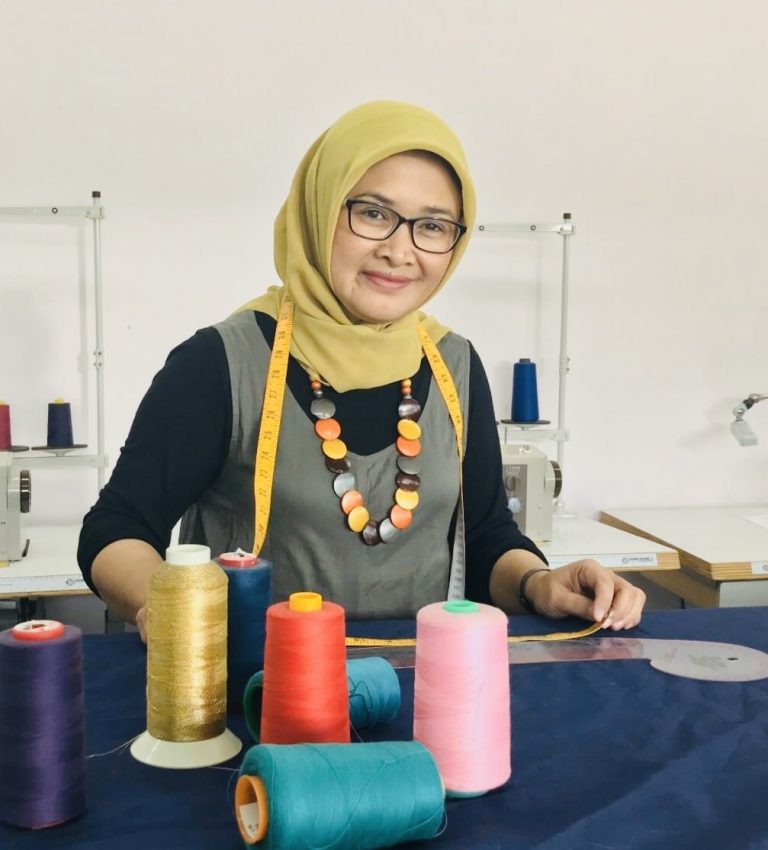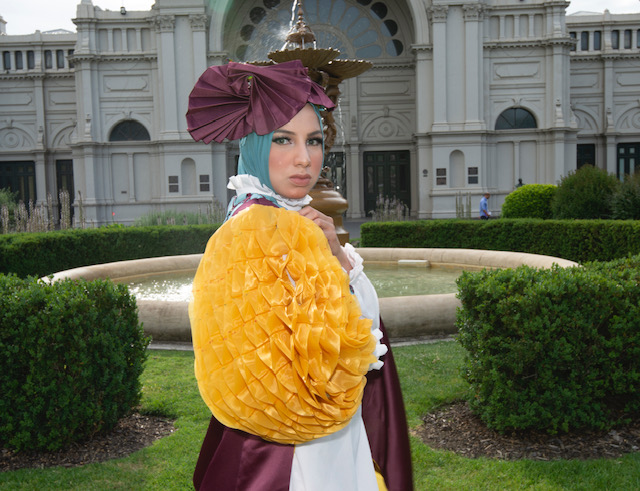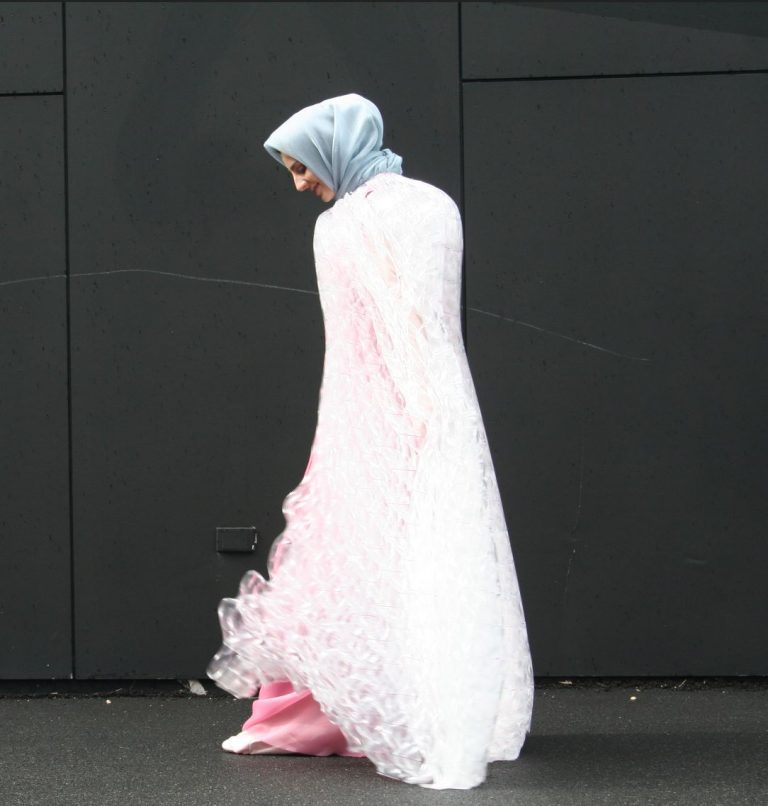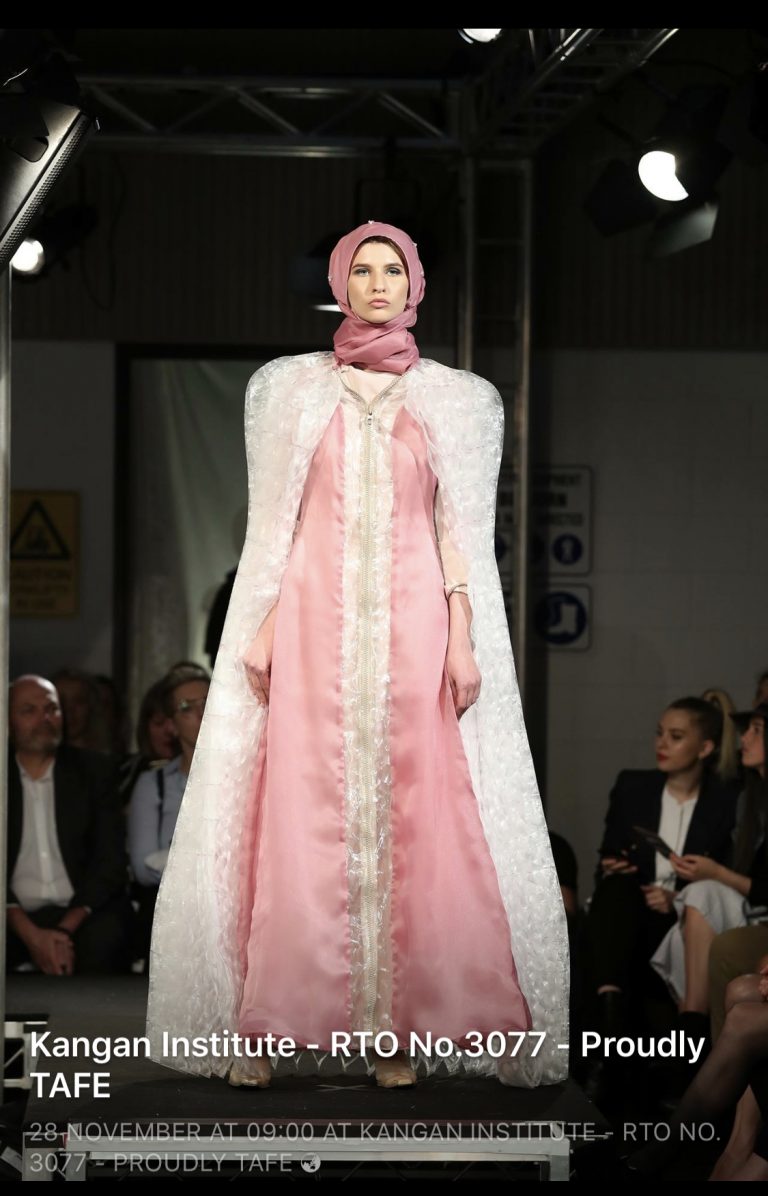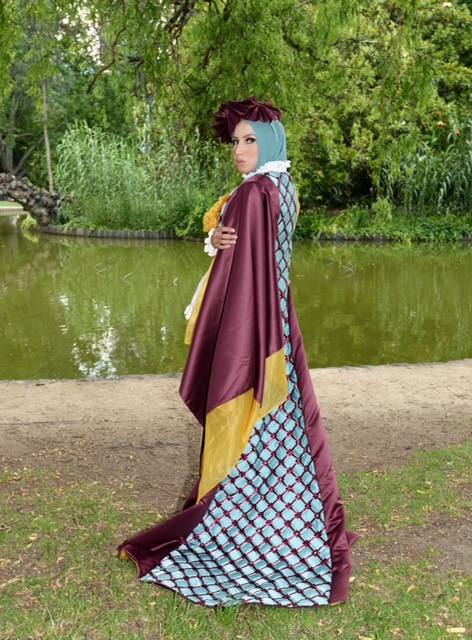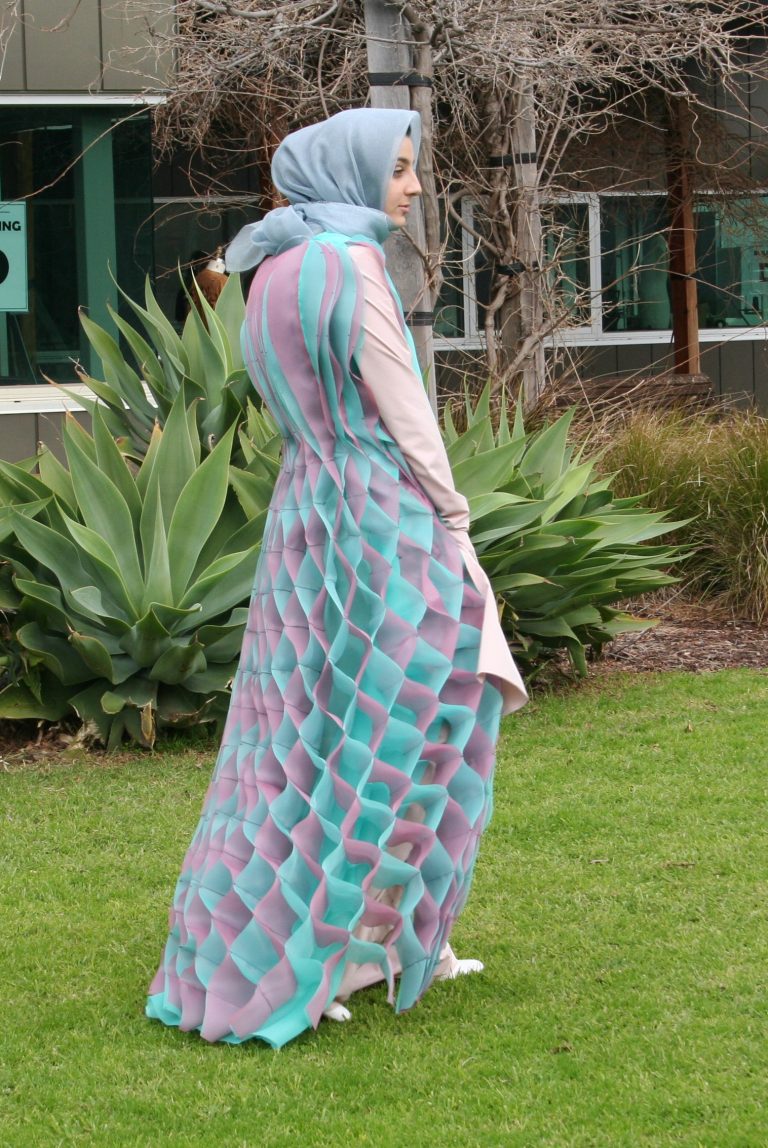Finding fashion at fifty
Finding fashion at fifty
For Umi Rasmi, fashion is an absolute pleasure. It’s where she can express herself and find joy. And it’s the most recent chapter in a life that has been full of devotion to others.
At fifty-two years old, Rasmi has two adult children. When her children graduated and decided to stay living in Victoria, she moved to join them. This marked a change from three decades of giving. Rasmi is a mother, English teacher and supporter of women experiencing domestic violence. It was only after the move that Rasmi made a chance decision to join a course in fashion design.
At her graduate show, the visionary curator Virginia Dowzer picked out Rasmi’s work. Rasmi spent most of her adult life in Darwin. In her work she creates honeycomb shapes inspired by casuarina pods. The curator inspired the fledgling designer to make this her signature style.
The threads of Rasmi’s experiences weave together to create her worldview. Her story is one of finding talent, joy and recognition when you least expect it.
Life in Indonesia
Rasmi grew up in a village in Indonesia. Her father was the most progressive man in the village. He was the school principal, but in his spare time, he liked to sew garments.
Rasmi’s father broke new ground when he tailored trousers for his wife, so she could be more comfortable. This innovation was big news in the village at the time. When his wife became a great badminton player, he introduced her to wearing shorts.
She reflects on her father’s behaviour, “He followed his own judgment. He helped his wife in the kitchen, even though the common belief at the time was that men didn’t belong there.”
Rasmi met her future husband when she was doing traditional Javanese dance, aged 15. Her suitor was an Aussie man. He spoke Indonesian and they struck up a friendship that lasted 6 years across the distance. Aged 21, Rasmi agreed to marry him and moved to Darwin.
Hitting rock bottom
The young couple had two children after they married. They moved from Darwin to Canberra, from Canberra to the Cocos Island, from there to Sydney and then back to Darwin.
Life was not as expected. After a few years, the marriage ended and it turned her life upside down. She found herself a single parent at the age of 27.
This was the lowest point for Rasmi. She had no friends, didn’t have a driver’s licence. She didn’t speak any English and didn’t know about Centrelink benefits.
“I knew no matter what, I would do anything to protect the children. But when I searched for a job that didn’t need English skills, I saw an advert offering to teach English for migrants for free. I did an interview, and I was eligible to join the course.”
She grasped the opportunity with both hands. “Within a year I had completed advanced English as a second language.”
Establishing a career
With her newfound language skills, Rasmi worked as an Indonesian interpreter for the Northern Territory Interpreter and Translator Service.
Later, her former-in-laws stepped up to support her to become a Bachelor of Economics. This furthered the accounting studies that she had begun in Indonesia. And she continued her postgraduate study to teach English as a second language.
She became passionate about helping migrants with English and understanding Australian culture. She knew the skills she had faced and so wanted to help others. She spent many years working with the Adult Migrant English Program.
Next, Rasmi took part as a committee member in Indonesian and Islamic community organisations in the Northern Territory and became involved with the Police, the Family Court and as a Non-English speaking advisor for the Top End Women Legal Service. This led her to work with victims of domestic violence. She became an advisory member for the domestic and Aboriginal family violence advisory council for the Chief Minister of the NT.
Finding fashion
In April 2016, Rasmi moved to Melbourne to be closer to her adult children who had completed their studies. Rasmi had remarried a decade earlier and her now husband and the children asked, “Why don’t you do something that you want to do, rather than finding a job?”.
Rasmi explains, “I was looking for sewing courses but only found options for Fashion Design. I was scared to do it, but I decided to enrol in Kangan Institute for one semester to learn sewing.”
She already had basic skills learned from her father.
“On the course, I learned how to draw, how to play with colours. I found out I like drawing! In the first semester I had to make a skirt. I did it quickly. The teacher said make the matching top, so I did. The set was selected for the fashion show. I was so amazed! I was 48 at the time. The other students were in their twenties and some of them called me mum.”
Weaving Harmony
After a long journey to get there, Rasmi completed her Advanced Diploma in Fashion Design and Merchandising at Kangan Institute in 2018.
Her final school project “Almost Naked” collection was showcased at Kangan Institute’s Empower Fashion Show, with one of her works included in Melbourne Fashion Week and Hong Kong Business Design Week.
One key piece is Jellyfish. She calls the series ‘almost naked’ because the material is transparent. It’s a metaphor for seeing through her life story.
And there’s her inner story, represented by the dress inside. The stitches move around the stress like a cyclone as a symbol of her turbulent life. She used a shower curtain, laser-cut into strips and sealed with heat.
Her latest piece is Weaving Harmony. She uses latticework to make a honeycomb shape. The design is inspired by casuarina pods as a symbol of weaving together different experiences. It’s a metaphor for Australian life, symbolising the strength of divergent paths.
She reflects, “I always like to explore things. I wanted to do something that was unusual or unique. I guess I’m like my father. What do I have to lose?”
Rasmi’s Islamic faith influences her designs which are conservative in style. These modest and elegant garments reflect the often-overlooked brilliance of women. Rasmi hopes to empower other women the way she has been empowered by fashion.
Bold ambitions
During the pandemic, Rasmi began making masks. She sold them in Melbourne, Darwin, NSW, and NT and New Zealand. She uses scrap material. From the profits to make masks for Indonesia where she has been able to donate $2,500 worth of masks.
Before the virus, Rasmi visited her parents in Indonesia twice a year. Now things look uncertain. Rasmi has a health condition that will prevent her from having the vaccine. So travel is out of the picture for the time being. Fashion is a place where she can process and create.
And there’s more to come. The newly established designer has a dream. She wants to create a foundation that brings all her talents together. Her ambition? To teach sewing to migrants, refugees and vulnerable people so they can become independent, too. For Rasmi it seems, everything is possible.
Rasmi says, her favourite quote comes from Kaci Diane, “I love the person I’ve become because I fought to become her.”
Watch the Fashion Unites film featuring Rasmi’s work here.
Note: Umi Rasmi is also known as Umi Sudibyo.
Written by Sara Tiefenbrun for Multicultural Museums Victoria, 2021
